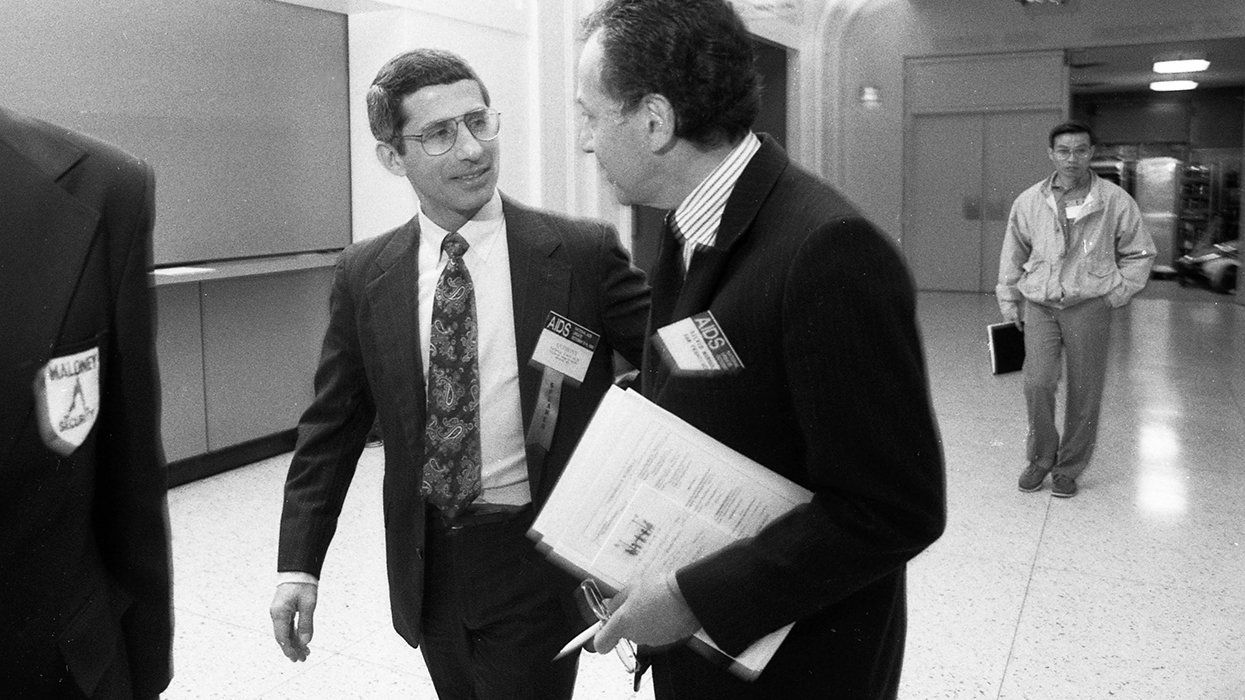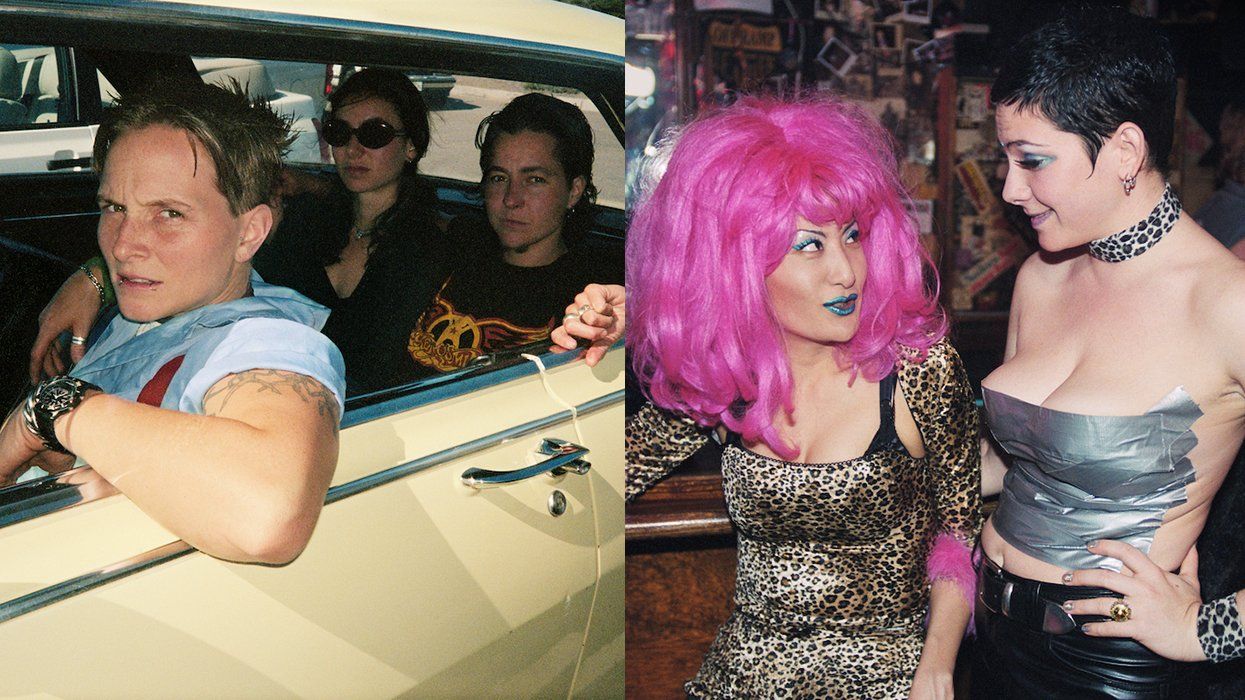When I received a copy of Dr. Anthony Fauci’s new book, On Call: A Doctor’s Journey in Public Service, which seeks to cover his nearly six decades in public service, I was surprised that it was less than 500 pages long. How do you encapsulate such a wide-ranging and remarkable career in public service?
Keep up with the latest in LGBTQ+ news and politics. Sign up for The Advocate's email newsletter.
“The hardest part was that there was so much that I wanted to put in and in order to make it a readable book that was a modest size and not overwhelming the reader with details,” Fauci told me during a long video call recently. “You tend to include every detail and every person, but you can’t, and you feel badly that you're leaving people and experiences out in order to maintain the flow of the book.”
What was something that he wanted to include but was cut out? “Well, I had a really nice private dinner with President George W. Bush and Laura and my wife and another couple, and it really gave a nice insight into President Bush, because we had nice discussions about any of a number of things.”
Speaking of presidents, many — wrongly — were more interested in his relationship and time with former President Donald Trump than anything else. There’s a chapter in the book about his experience working with Trump, which if it’s distilled into one word would be described as “whiplash. Fauci calls Trump “complex,” but the time with Trump is a tiny fraction of his story. So I only had to say one word to Fauci, phrased as a question, “Trump?”
“I mean, yes, I know what you mean. It was clear that this was a memoir of my 83 years of my life, 54 of which was spent at the [National Institutes of Health] and almost 39 of which were spent as the director of [the National Institute of Allergy and Infectious Diseases], and whittling it down further, COVID was only about three and a half year of those years, and my time with Trump was one year — one year out of 54 years. It’s the story of my life and not about that very short period of time with Trump.”
“Besides,” he added, “if I gave every encounter I had with Trump the book would be boring. My relationship with George W. Bush and with the development of [the President’s Emergency Plan for AIDS Relief] was eminently more important than my relationship with Trump.”
I’ve spoken to Fauci numerous times, and we’ve discussed the fact that PEPFAR is perhaps the one initiative that he’s most proud of. “PEPFAR impact has been truly remarkable,” Fauci told me previously. "It is one of this country’s greatest global health policies in history. It’s been a resounding success and has saved at least 25 million lives worldwide, and it provides antiretroviral treatments for over 20 million people worldwide.”
In the book, Fauci does explain, in detail, his work through the AIDS crisis in the 1980s and ’90s. I asked him if writing about those harrowing times was difficult for him. “I don't think that was difficult, but it was meaningful in so many ways,” he responded. “It was a very interesting experience to go back and reflect on what you've been through, because when you're going through it, it's such an intense, rapid-fire pace that you don't have a chance to reflect on it, you just do it.”
On another previous occasion late last year, he told me that the antigay attitude of people was as bad as he’s ever seen it. Did he still feel that way, particularly as he wrote about how AIDS patients were treated so horribly during those dark days. “It's interesting, it was kind of cyclic, because back in the early years of the early ’80s, with HIV, there was stigma associated with the combination of being gay and either being at risk for HIV or already infected with this terrible new virus,“ he said.
“And somewhere, if you look at the 50 years that I've been involved, and in the very early years, we had a diversity of opinion,” Fauci continued. “You had center, center left or left, center right, far right. But the diversity wasn't really manifested in profound divisiveness. And today, we have a very divided country, a country that's divided where the other side seems like the enemy, as opposed to somebody that just has a reasonable disagreement with you. And unfortunately, the LGBTQ+ issues are ones that are in many respects embraced by the center, center left and rejected by the center right and far right So, I think the discrimination and the hostility towards the LGBTQ+ community is intensified by the divisiveness in the country. I think it's just another casualty of the divisiveness that seems to be prevalent in our society.”
Along those lines, I asked Fauci about his relationship with gay men, not from a professional POV, but personally. How important have gay men been in his life? “Oh, very important,” he emphasized. “I have a lot of very close friends who are gay. I have three daughters and two of them have gay godfathers.”
“In my culture, the Italian/Irish culture, being a godfather is a very important position in someone's family. When you choose someone to be the godfather of your child, that’s a big deal. And the godfather of my eldest daughter is a gay man. And the godfather of my middle daughter is a gay man. And as a whole, the LGBTQ+ community has been an very important part of my personal interactions and journey.”
I told Fauci about my late godfather, who had a deep religious faith, and about my late friend Father Angelo and how Fauci reminded me of him — which is a huge compliment. In the book, Fauci talks about his Catholic faith as a student, first at Regis High School in Manhattan and then at the College of the Holy Cross. I wondered how important faith has been during his life.
“You know, it's interesting. John, it isn't faith in the sense of a strict religious person. It's more of the principles that I learned predominantly from the Jesuit education at Regis High School and in college. And what I learned was about honesty, integrity, fairness, and relying on intellectual pursuits of scholarship, I mean, much more towards that than faith in a God, for example. It's much more about the principles that are associated with the religious background that I have, which is much more of a secularization of it than the deep religious aspect.”
At 83, Fauci looks and acts like someone 20 years younger, and during all the times I’ve spoken with him, he has always been remarkably upbeat, even during the COVID crisis. To me, that spoke partly to the happiness he had in his career. Was that the case? “Oh, yes, for sure. It energizes you, and when you're energized, it shows itself, psychologically and physically.”
Fauci added that he has good genes, which have also played a part in his youthful demeanor. “My father died when he was 97. And he looked like he was 65. So genes, in combination with the excitement that you feel about what you're doing, it really keeps you young.”
I asked Fauci if, during the time he was writing and putting all the pieces together, did he ever stop and say, “Wow, I did all of that?” “You're right! When you put it all together, it's been an amazing journey. And that's the reason why, as the subtitle says, a doctor's journey in public service, because it really has been a journey of more than half a century.”
“When you go back and you think about it, you don't appreciate it. The last few paragraphs of the book are when I leave the NIH and turn around and look back at the place that I drove into as a fellow 54 years earlier. It's tough to believe, but it's true, and to me that's amazing."
















